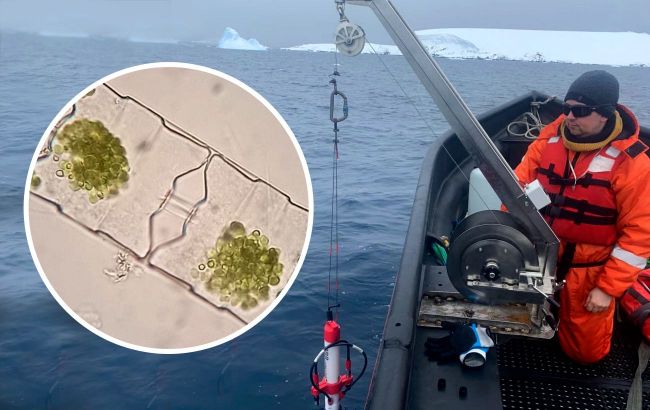Global warming alert: Ukrainian scientists discover sudden chlorophyll increase in ocean
 Global warming alert: Ukrainian scientists discover sudden chlorophyll increase in ocean (RBC-Ukraine collage)
Global warming alert: Ukrainian scientists discover sudden chlorophyll increase in ocean (RBC-Ukraine collage)
Scientists at the Antarctic Akademik Vernadsky station have detected a sudden chlorophyll increase in the ocean near Galindes Island. Experts have already determined the factors that triggered the increase, according to the National Antarctic Scientific Center.
What the scientists say
In November 2023, at all monitoring points where water samples were taken, this indicator was 2.5-3 times higher compared to November 2022.
Researchers suspect that it's connected to the consequences of global warming, as recently Antarctica has been experiencing record-low areas of sea ice, so the ocean receives more sunlight and warms up.
According to experts, last November, the water temperature at monitoring points ranged between -1.1 and -0.7°C, while this year it ranged between 0.3 and 0.9°C.
Increased chlorophyll level - What does it mean
Light and increased temperature accelerate the process of photosynthesis in plants, in which chlorophyll plays an important role. Therefore, the increase in chlorophyll in water samples indicates the active development of plant organisms (phytoplankton) in the ocean.
This includes single-celled microscopic or even nanophytoplankton, which are difficult to see with the naked eye.
Phytoplankton is the basis of the ocean's food chain, so its increase triggers cascading processes and affects the life of other marine organisms.
More light will also cause changes in the species composition of microalgae, implying alterations in the size of their cells and other characteristics.
Consequences
According to scientists, all these processes will alter the architecture of food webs in the ocean and have global consequences in marine ecosystems.
Ukrainian scientists conduct continuous research on phytoplankton. They regularly collect water samples in specific locations around the island.
In the laboratory, they filter this water, extracting samples of phytoplankton and bacterioplankton, and determine the chlorophyll and hydrochemical indicators (concentrations of oxygen, iron, nitrate, nitrite, sulfate, etc.).
Bacteria- and phytoplankton samples are fixed, stored under special conditions, and then transported to Ukraine for further study.
According to previous research by scientists, the process of active phytoplankton development occurs annually in the spring-summer period, and various groups of organisms may cause it.
Studying this difference allows tracking the impact of climate changes on the marine environment. The current samples that showed such an increase in chlorophyll will be carefully studied for the composition of bacterial and phytoplankton groups and their interactions.

